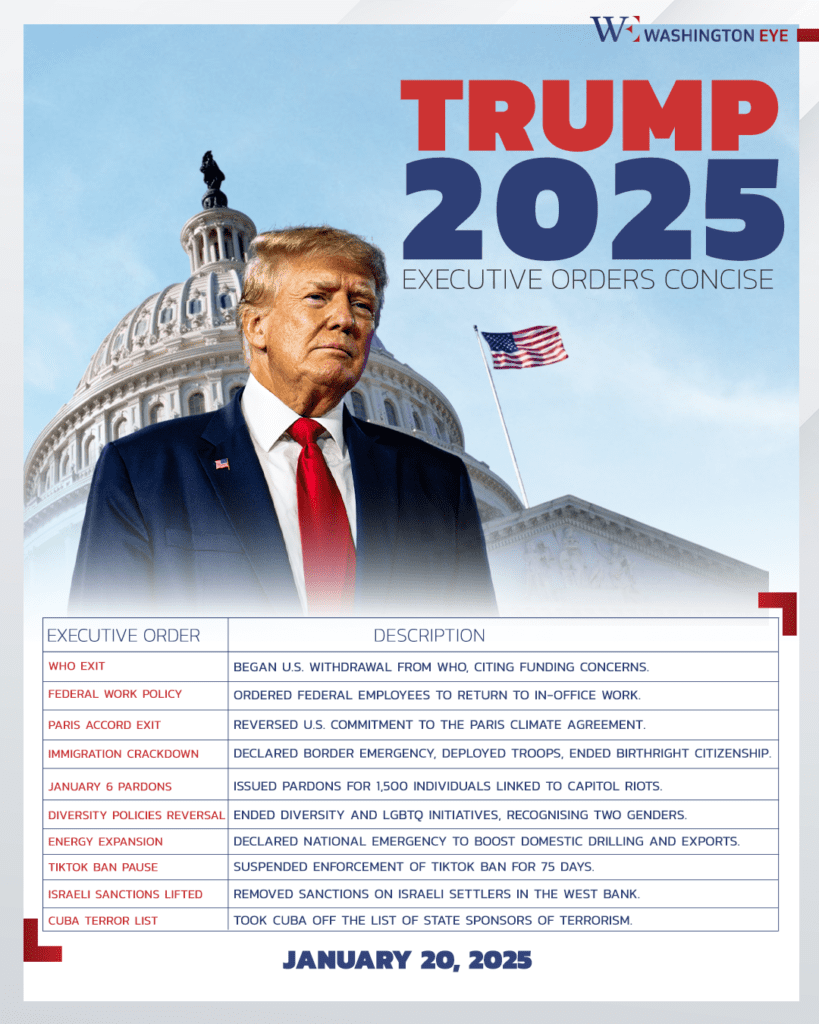Donald Trump’s inaugural address, delivered on January 20, 2025, outlined a bold and contentious vision for the future of America. With a focus on “America First” policies, his speech set the stage for a presidency poised to redefine the United States’ global and domestic strategies, sparking debate over the implications of his proposed policies. In this comprehensive analysis, we dissect the main themes of Trump’s speech, notable moments from the event, and the potential global repercussions of his policy priorities.
A Speech Rooted in Populism
Trump’s address was steeped in rhetoric that sought to appeal directly to his base, emphasizing a return to “American greatness” through unilateral action and a rejection of globalism. Central to his message was the concept of prioritizing national resources and sovereignty. His repeated phrase “Drill, baby, drill, baby” reflects his plan to boost the fossil fuel industry as a core part of U.S. energy and economic policy. Trump’s assertion framed energy independence as critical to national security, signaling a rollback of environmental regulations in favor of aggressive oil and gas exploration. This approach is poised to conflict with global climate initiatives, potentially isolating the U.S. from international coalitions on climate change.
Withdrawal from the WHO and Its Implications
One of the speech’s most striking announcements was Trump’s commitment to withdraw from the World Health Organization (WHO). He characterized the organization as a bureaucratic entity beholden to international elites, framing his decision as reclaiming American autonomy in global health strategies. While this move aligns with Trump’s broader critique of multilateral institutions, it raises concerns about the U.S.’s ability to respond effectively to transnational health crises. Critics argue that this decision could erode global health networks, as the WHO relies heavily on U.S. funding and participation.
Strategic Outlook on Trade and Foreign Policy
Trump’s speech painted a vision of economic nationalism, emphasizing “fair trade” agreements over traditional free trade paradigms. His pledge to renegotiate existing treaties reflects a desire to challenge China’s dominance and protect domestic industries. From a strategic standpoint, this approach could recalibrate global trade relations, particularly if coupled with tariffs or other protectionist measures. However, these policies may also strain alliances with traditional partners and disrupt global markets.
Policies and Promises
Immigration Policy and Border Security
Trump pledged to reform immigration policies, emphasizing the construction of a “state-of-the-art” border wall to curb illegal crossings. He also aimed to streamline legal immigration processes, presenting this as a balanced approach to national security and economic growth. These measures reflect his administration’s commitment to prioritizing national sovereignty and addressing public concerns over border control.
Education Reform
Education reform was another prominent focus in Trump’s speech. He promised to expand school choice, providing parents with greater freedom to select educational pathways for their children. Trump also criticized what he termed bureaucratic overreach in public education, signaling potential rollbacks of federal involvement in favor of state and local governance.
Healthcare Overhaul
Trump vowed to overhaul the healthcare system, promising a “better and cheaper” alternative to the Affordable Care Act. While specifics were not outlined, his rhetoric suggested a focus on reducing costs and increasing accessibility, aligning with conservative ideals of minimizing federal intervention in healthcare.

Gender Policy
Trump introduced a policy aimed at redefining gender strictly as male or female based on birth assignment. This executive order, titled “Defending Women from Gender Ideology Extremism and Restoring Biological Truth to the Federal Government,” focuses on revising federal policies, including those related to documentation and housing assignments. Additionally, Trump announced that transgender individuals would no longer be allowed to serve in the military, explaining the decision as a matter of operational readiness and cost efficiency.
Gun Control
Trump reaffirmed his commitment to the Second Amendment, emphasizing his support for law enforcement and the rights of gun owners. His rhetoric suggested a hardline stance against additional gun control measures, instead focusing on enforcing existing laws, which entail ensuring compliance with background checks, regulating firearm sales through licensed dealers, and prosecuting illegal firearm possession.
Voting Rights
During his inauguration speech, Trump touched on issues related to voter ID laws and electoral integrity. He announced plans to intensify voter ID requirements and investigate alleged voter fraud in previous elections. These measures, according to Trump, are intended to protect the sanctity of elections and restore public confidence in the democratic process. However, critics argue that such policies could disproportionately impact minority and low-income communities, potentially suppressing voter turnout. The controversy surrounding this announcement highlights ongoing divisions over election security and voting access.
Elon Musk’s Controversial Gesture
A notable moment from the inauguration’s sidelines involved Elon Musk, a prominent entrepreneur recently appointed by Trump to lead the Department of Government Efficiency (DOGE). Musk sparked outrage by making what appeared to be a Nazi-related gesture during the event. On social media, Musk clarified that the gesture was intended as a satirical critique of authoritarianism, describing it as an attempt at dark humor. Despite his defense, the incident attracted widespread condemnation and reignited debates about the responsibilities of public figures in politically sensitive environments. As the head of DOGE, Musk’s role in government adds another dimension to this controversy, amplifying the symbolic weight of his actions and their potential impact on public perception and political credibility.
The Global Ripple Effects
Trump’s “America First” policies have significant implications for global stability and international relations. His emphasis on energy independence, encapsulated in the “Drill, baby, drill” directive, signals a return to fossil fuels and a potential retreat from global climate commitments. This approach not only isolates the U.S. from climate coalitions such as the Paris Agreement but also places it at odds with allies advocating for renewable energy transitions. The ripple effects may include reduced U.S. influence in global environmental policymaking and emboldened actions by other states to dictate the climate agenda.
The decision to withdraw from the WHO has far-reaching consequences for global public health. As one of the largest contributors to the organization, U.S. disengagement weakens the WHO’s ability to coordinate responses to transnational health crises. Countries heavily reliant on the WHO’s frameworks may face disruptions in disease management and vaccine distribution, while countries like China could seize the opportunity to expand their influence in global health governance.
Trump’s focus on border controls and immigration reform has regional ramifications, particularly for U.S.-Mexico relations. The construction of a fortified border wall and stricter immigration policies may strain diplomatic ties, potentially disrupting trade and cooperative efforts to address migration challenges in the Western Hemisphere. Neighboring countries may perceive these actions as symbolic of U.S. disengagement from shared regional responsibilities.
Economic nationalism and trade renegotiations further complicate global dynamics. By prioritizing bilateral agreements, Trump’s policies challenge multilateral trade frameworks, potentially destabilizing established global trade networks. This shift creates opportunities for emerging powers, such as China, to fill the void and strengthen their economic alliances.












